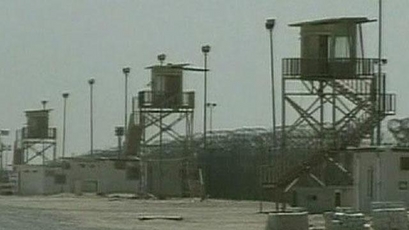Iraq WikiLeaks release offers new casualty details
BAGHDAD – An Iraqi family gunned down after approaching a U.S. patrol too fast. Dozens of men shot execution-style by sectarian death squads.
Grisly killings of civilians have come to define the Iraq war. New details found in government documents released by WikiLeaks, however, provide a surprising level of detail about many attacks and raise questions about how much the U.S. military knew during the months it sought to downplay reports of the slaughter.
The documents include reports from soldiers on the ground about day-to-day violence and individual attacks — including shootings, roadsidebombings, and the execution-style killings and targeted assassinations that left bodies in the streets of Baghdad at the height of sectarian violence that pushed the country to the brink of civil war.
The information is full of military jargon and acronyms but often includes names of victims, times of day of the attacks and the neighborhoods where they occurred.
That contradicted years of statements by American officials, who have repeatedly resisted providing information about civilian casualties. The U.S. military often told journalists in Baghdad it did not keep detailed records of civilian deaths or have information on particular attacks. In 2006 and 2007, the Bush administration and military commanders repeatedly denied Iraq was sliding into civil war and often played down the extent of civilian carnage, much of which had no direct effect on U.S. forces.
The reports also point to a higher death toll than previously believed.
Iraq Body Count, a private British-based group that has tracked the number of Iraqi civilians killed since the war started in March 2003, said it had analyzed the information and found 15,000 previously unreported deaths. That would raise its total from as many as 107,369 civilians to more than 122,000 civilians.
Should WikiLeaks be subject to U.S. state secrets enforcement? |
Rights groups criticized Washington for not releasing the information, insisting that casualty information did not pose a national security risk.
"The American public has a right to know the full human cost of the wars in Afghanistan and Iraq," Jameel Jaffer of the American Civil Liberties Union said in an e-mail. "A lot of this information should have been released to the public a long time ago."
The U.S. military has maintained careful records of the number of American service members who have died in Iraq — 4,425 as of Saturday.
But civilian casualty figures in the U.S.-led war in Iraq have been hotly disputed because of the political stakes in a conflict opposed by many countries and a large portion of the American public. Critics on each side of the divide accuse the other of manipulating the death toll to sway opinion. Independent confirmation of deaths in any particular attack was hard to obtain, since journalists and watchdog groups were often unable to go to the sites of many attacks due to the volatile security situation that prevailed for much of the war.
The Iraqi government has issued a tally claiming at least 85,694 civilians and security officials killed between January 2004 and Oct. 31, 2008.
In August 2008, the Congressional Research Service said the U.S. military was withholding statistics on Iraqi civilian deaths. The Pentagon did publish in June 2008 a chart on monthly civilian death trends that showed it peaking at between 3,500 and 4,000 in December 2006. But it did not release the data used to create the chart.
In July this year, responding to a Freedom of Information Act request, the U.S. military quietly released its most detailed tally to date — 63,185 civilians and 13,754 Iraqi security forces killed between January 2004 and August 2008.
Musaab Adnan, whose 27-year-old brother was killed in 2006 in the crossfire between U.S. forces and insurgents in the western town of Haditha, said the new WikiLeaks information would remind the world of the war's brutality.
"It is hard to forget what happened. Those who were lost will never be compensated. But the publication of these documents will show the world the atrocity of these crimes against the Iraqis," he said Saturday.
The war logs were made public in defiance of the Pentagon, which insisted that the release would put the lives of U.S. troops and their military partners at risk.
Although the documents appear to be authentic, their origin could not be independently confirmed, and WikiLeaks declined to offer any details about them. The Pentagon has previously declined to confirm the authenticity of WikiLeaks-released records. But it has put to work more than 100 U.S. analysts to review what was previously released and has never indicated that any past WikiLeaks releases were inaccurate.
Pentagon press secretary Geoff Morrell insisted the U.S. had done its best to prevent innocent civilians from being killed.
"It has been a driving force for us, a guiding principle for us over the last seven years of this conflict to do everything in our power — perhaps more than any other military in the history of the world has ever done — to minimize civilian casualties," Morrell said Friday.
The 391,831 documents, which date from the start of 2004 to Jan. 1, 2010, provide a ground-level view of the war written mostly by low-ranking officers in the field.
WikiLeaks offered The Associated Press and other news organizations access to a searchable database of redacted versions of the reports three hours prior to its general release Friday. A few news organizations, including the New York Times, Le Monde, The Guardian and Der Spiegel, were given access to the material far earlier.
Iraq Body Count said it counted 109,032 violent deaths reported in the documents, including 66,081 civilians. It cross-referenced the reports with media reports in its own database and determined that 15,000 were new.
IBC's John Sloboda praised the U.S. military for making such detailed records — but criticized it for keeping the material secret.
"Day by day, secretly, soldiers all over Iraq have been writing detailed reports of the violent deaths they cause, witness or are informed about," he told reporters Saturday in London. "It is very good that this data has been collected but it is wrong and unjustifiable that it has been kept secret for so long."
In one example, he said the war logs confirmed media reports of 35 bodies found in Baghdad on Nov. 1, 2006, but the military documents had additional information about the timing of the findings and the neighborhoods in which they were found, as well as some of the identities of those killed.
Al-Jazeera, one of several news organizations provided advance access to the WikiLeaks trove, said that from a review of the documents, it tallied reports of 681 civilians killed in error by U.S. and allied forces at checkpoints or by passing convoys. It said most occurred in mainly Sunni areas, which have traditionally provided the bulk of support for the insurgency.
Haidar Jabbar, a 55-year-old father of four in Baghdad, said the documents dealt another blow to the U.S. legacy in Iraq.
"It is another black spot in the reputation of Americans in Iraq," he said.
___
Gamel reported from Cairo. Associated Press writers Hamid Ahmed in Baghdad, Sameer N. Yacoub in Amman, Jordan, and Raphael Satter in London contributed to this report.
http://news.yahoo.com/s/ap/20101023/ap_on_re_mi_ea/wikileaks_iraqi_death_toll




Tidak ada komentar:
Posting Komentar